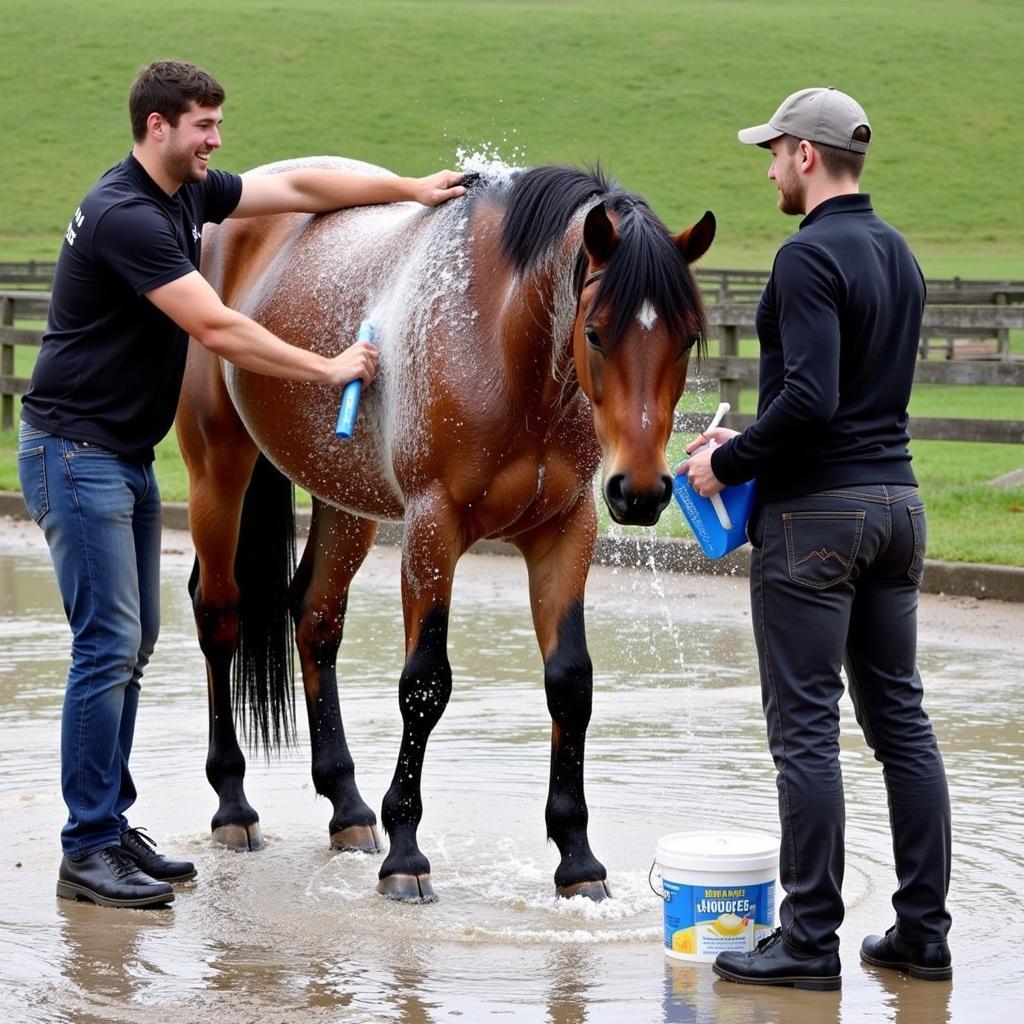Horse Cooling is a critical aspect of equine care, especially during hot weather or after strenuous exercise. Proper cooling techniques can help prevent heatstroke, muscle soreness, and other health complications. This comprehensive guide will delve into the importance of horse cooling and explore various effective strategies to ensure your horse stays comfortable and healthy.
Understanding the Importance of Horse Cooling
Horses generate significant heat during exercise, and their natural cooling mechanisms may not always be sufficient to dissipate this excess heat quickly enough. When a horse’s body temperature rises too high, it can lead to heat stress, exhaustion, and even life-threatening conditions like heatstroke. Effective horse cooling methods are crucial for regulating body temperature and promoting recovery after exertion.
Cooling down a horse isn’t just about dumping water on them. It’s a process that requires understanding how horses regulate their temperature and what methods are most effective. For example, did you know that a horse’s sweat contains electrolytes, crucial for muscle function? Simply hosing a sweaty horse down can wash away these essential electrolytes.
After a demanding ride, consider offering your horse electrolytes to replenish those lost through sweating. Proper horse cooling goes hand-in-hand with overall equine health and well-being. We also recommend cooling boots for horses to help reduce inflammation and speed up recovery after strenuous exercise.
Why is Horse Cooling Crucial After Exercise?
When a horse exercises, its muscles produce heat. This heat needs to be dissipated efficiently to prevent overheating. Cooling down helps reduce the horse’s heart rate and respiratory rate back to normal, preventing potential health risks. Ignoring proper cooling procedures can lead to muscle stiffness, tying-up, and other performance issues in the long run.
 Horse Cooling After Exercise
Horse Cooling After Exercise
Effective Horse Cooling Methods
There are several effective methods for cooling a horse, each with its own advantages. Choosing the right method depends on various factors like ambient temperature, humidity, and the intensity of the horse’s workout.
Water Cooling Techniques
Water is a highly effective cooling agent for horses. However, the method of application is crucial. Avoid directly spraying cold water on a hot horse as this can cause muscle cramping. Instead, use lukewarm water and apply it in a gentle, continuous stream, focusing on large muscle groups like the neck, shoulders, and legs. A horse riding cooling vest can be a great supplement during rides, especially in hot weather.
For optimal results, scrape off excess water frequently to encourage further evaporation and cooling. Repeat the process of applying and scraping water until the horse’s breathing returns to normal.
Utilizing Cooling Equipment
Various cooling equipment can assist in the cooling process. Cooling boots for horses can be particularly helpful in reducing inflammation and promoting faster recovery after intense exercise. Likewise, horse barn fans can help circulate air and create a cooler environment for horses, especially during hot and humid weather.
Looking for a convenient way to keep your horses cool and protected from insects while riding? A horse riding cooling vest can be a perfect solution.
Natural Cooling Methods
Allowing horses to graze in a shady area after exercise can also contribute to their cooling process. The gentle movement and access to fresh air can help regulate their body temperature naturally. Consider using a natural bug spray for horses to keep insects away while they graze and cool down.
Common Horse Cooling Mistakes to Avoid
One common mistake is using ice-cold water directly on a hot horse. This can constrict blood vessels and hinder the cooling process. Another mistake is inadequately scraping excess water after application, which can insulate the horse and trap heat. Over-cooling a horse can also be detrimental, leading to chills and other complications.
Dr. Emily Carter, a renowned equine veterinarian, advises, “The key to effective horse cooling is a gradual and consistent approach. Avoid sudden temperature changes and prioritize proper hydration.”
Signs of Overheating in Horses
Recognizing the signs of overheating is crucial for timely intervention. These signs include rapid breathing, elevated heart rate, excessive sweating, and lethargy. If you observe any of these signs, immediately move the horse to a shaded area, apply lukewarm water, and contact a veterinarian.
John Miller, an experienced horse trainer, emphasizes, “Prevention is always better than cure. Proactively implement horse cooling strategies to avoid overheating in the first place.”
 Identifying Signs of Overheating in Horses
Identifying Signs of Overheating in Horses
Conclusion
Horse cooling is an essential aspect of equine care, especially during strenuous activities and hot weather. By understanding the importance of horse cooling and implementing effective cooling strategies, you can ensure the health, well-being, and optimal performance of your equine companion. Remember, proper horse cooling contributes significantly to a long and healthy life for your horse.
FAQ
- How long should I cool down my horse after exercise? Until their breathing and heart rate return to near normal.
- Can I use ice on my horse? Use caution; ice can constrict blood vessels, hindering cooling. Consult a vet.
- What are the signs of heatstroke in horses? Rapid breathing, elevated heart rate, lack of sweating, staggering, and collapse.
- How can I prevent my horse from overheating? Provide adequate shade, water, and implement proper cooling procedures after exercise.
- Are cooling boots beneficial for horses? Yes, they can help reduce inflammation and aid recovery.
- Can I use a fan to cool my horse? Yes, horse barn fans can be very effective.
- What should I do if my horse shows signs of overheating? Move them to a shaded area, apply cool water (not ice cold), and contact a vet immediately.
Need further assistance with horse cooling or related equine care? Contact us! Phone: 0772127271, Email: [email protected], or visit us at QGM2+WX2, Vị Trung, Vị Thuỷ, Hậu Giang, Việt Nam. We offer 24/7 customer support. Also check out our articles on biofreeze for horses and natural bug spray for horses.